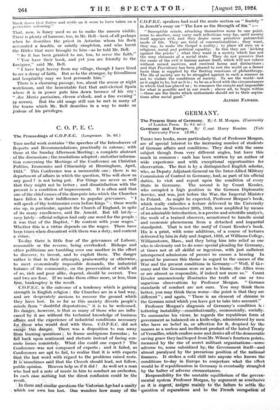C. 0. P. E. C.
Tins useful work contains "the speeches of the Introducers of Reports and Recommendations, practically in. extenso ; with those at the Sunday Afternoon Meeting ; a complete abstract of the discussions ; the resolutions adopted ; andother informa- tion concerning the Meetings of the :Conference on Christian Politics, Economics and Citizenship at Birmingham, April, 1924." This Conference was a• memorable one ; there is no department of affairs in which the question, Who will show us any good ? is not being put. For things are never so well that they might not be better; and dissatisfaction with the present is a condition of improvement. It is often said that one of the chief causes of the disrepute into which the Churches have fallen is their indifference to popular grievances. " I will speak of thy testimonies even before kings " : these words rise up, in particular, against the Church of England, in spite of its many excellences, said Dr. Arnold. But till lately— very lately—official religion had only One word for the people : it was that of the Baptist, " Be content with your wages." Whether this is a virtue depends on. the wages. There have been times when discontent with them was a duty, and content
a crime. '
Tolday theie. is little fear of the grievances of Labour, reasonable or the reverse, being overlooked. Bishops and other politicians are tumbling over one another in the effort to discover, to invent, and to exploit theM. The danger rather is that in their attempts, praiseWorthy or otherwise, to meet economically impossible. demands, the industrial balarice of the community, on the preservatiOn of which all of Us, rich and poor alike, depend, shoUld be overset. Two and two are, four. If we 'make them either more, or less, than fOur, bankruptcy is the result.
C.O.P.E.C, is the Outcome of a tendency which is gaining strength in English religion : the Churches are in a bad way, and are .deSperittely anxious to recover the ground which they have lost. In so far as this anxiety diverts people's minds - from " doubtful disputations," it is to be welcomed. Its danger, however, is that so many of those who are influ- enced by it are without the technical knowledge of business affairs, and the experience of industrial conditions necessary tbose who would deal With them. C.O.P.E.C. did not escape this danger. There was a disposition to run away from 'Aiming questiona ; to frame ambiguous formulas ; to fall back upon sentiment and rhetoric instead of facing con- crete issues concretely. What else could one expect ? The Conference -was not composed of experts ; and it failed, as Conference's are apt to _fail, to realize 'that it is with experts that the last word with -regard to the problems raised rests. It isIometiines said that the Church should lead, not follow, public opinion. Heaven help us if it did As well set a man who had not a note of music in him to conduct an orchestra. In each case nothing biit the direst confusion could be the result.
In these and similar questions the Victorian Agehad a sanity which our own has lost. One wonders how many of the
C.O.P.E.C. speakers had read the acute section on " Society in Jowett's essay on " The-Law. as the Strength of Sin "
Susceptible minds, attaching themselves some to one point, some to another, may carry such reflections very far, until society itself appears evil, and they desire some primitive patriarchal. mode of life. They are tired of conventionalities ; they want, they say, to make the GoSpel a reality ; to place all men on' a religious, social and political equality. • In this they are kicking against the pricks ' ; what they want is a society which has not the very elements of a social state. They do not perceive that the cause of the evil is haman nature itself, which will not cohere without mixed motives, and received forms and distinctions ; and that Providence has been pleased to rest the world on a firmer basis than is supplied by the fleeting emotions of philanthropy. The ills of society are to be struggled against in such a manner as not to violate the conditions of society. To see the world—not as it ought to be, but as it is ; to be on a level with the circumstances in which Cod has placed us ; to renounce the remote and impossible for what is possible and in our reach ; above all, to begin within —these are the limits which enthusiasts should set to their aspira- tions after social good."
ALFRED FAWKES.


































 Previous page
Previous page